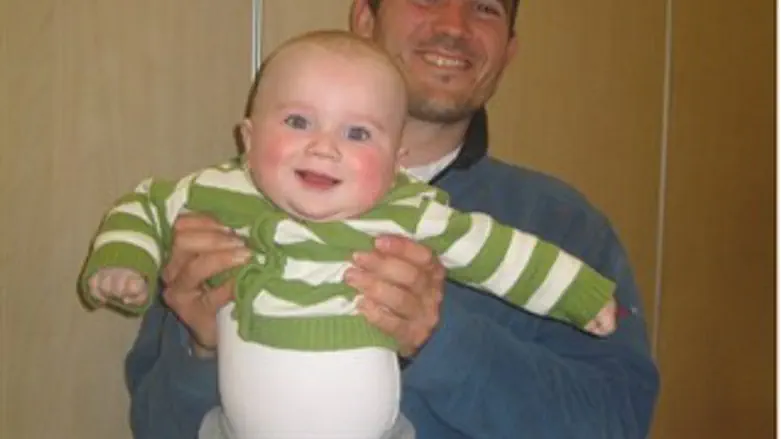
Arab rock-throwers are getting more creative -- in a deadly way.
In the Middle East, rocks are plentiful, free, and sometimes lethal. Since ancient times, they have been a method of execution. So it is no wonder they have been a weapon of choice for Palestinian attackers.
On the evening of June 5, 2001, American citizens Benny and Batsheva Shoham were driving home after paying a condolence call in Ra'anana. Their five month-old son, Yehuda, was asleep in the back, strapped in his car seat. As they passed near an Arab village, Luban a-Sharkiya, rock-throwers attacked. One heavy rock crashed through the front windshield and struck the baby in his head, killing him.
In other instances, the rocks don't hit the passengers directly, but the smashing of a windshield causes the car to crash. Eleven year-old Chava Wechsberg, a U.S. citizen, was killed when the car in which she was riding was attacked in the Gush Etzion region on February 24, 1993, causing it to crash.
If the crash doesn't kill the victim, it can at least set up the kill. Amnon Pomerantz drove by mistake into the Arab town of El-Bureij on the first day of Rosh Hashanah in 1990. Arabs stoned the car until he crashed. Then, as he lay slumped unconscious over the driving wheel, they burned him alive. Yeshohua Weisbrod, an accountant, made a wrong turn into Rafah on March 4, 1993. Arab rock-throwers attacked, causing the car to crash. A terrorist with a machine-gun then walked up to the vehicle and finished him off.
But even the abundance of rocks -- and of such grizzly incidents -- are insufficient for some Palestinian assailants. So they have come up with some creative new ways to threaten Israeli lives.
In one recent attack on a Jewish school bus in Jerusalem, a group of attackers threw rocks at the windows, while their comrades hurled plastic bags of black paint at the front windshield. Why the paint? So that the driver would be unable to see the road and would crash.
The improvised roadblock is another deadly tactic. An Israeli family returning from a visit to the Western Wall on September 11, 2014, made a wrong turn and accidentally drove into the Jerusalem Arab neighborhood of Wadi Joz. The mother, Mrs. Etti Cohen, later described to reporters how as their car slowed down to seek an exit from the area, there were shouts in the street and three Arab cars suddenly blocked them from moving forward. It was a well-coordinated ambush. Rocks and bricks were thrown from all directions, smashing both the front and rear windshields, and barely missing the children in the back seats. They escaped only when her husband drove wildly onto the sidewalk, getting around the car-roadblock.
Having carried out tens of thousands of rock-throwing attacks -- 1,195 in 2013 alone, according to Israeli army statistics -- Palestinian attackers have ample opportunities to fine-tune their craft. By now they understand the laws of physics and the ways to cause maximum damage. They know that a rock thrown at a car traveling towards them at high speed has a much greater impact than a rock thrown at a stationary target, since the speed of the victim intensifies the damage caused by the rock.
Indeed, that was how a Palestinian rock-thrower was killed by his own rock, during an attack near the Israeli community of Emanuel on January 13, 2009. One of the rocks that he threw at his would-be-victim bounced off one of the tires and hit the attacker in the head. Because of of the high speed of the car, the ricocheting rock struck the assailant with such force that it killed him.
It did not take Arab rock-throwers long to figure out that they could double the impact of a rock by throwing it from a car moving at high speed, aimed at another moving car coming in the opposite direction.
The most infamous victims of this tactic were American citizens Asher Palmer and his baby son Yonatan. On September 23, 2011, they were driving on Highway 60, on their way to Jerusalem to meet Palmer's wife, who was then expecting their second child. Near the village of Halhoul, rocks were thrown at their car from passengers in an Arab car traveling towards them from the opposite direction. The tremendous impact of the rocks smashed the front windshield of Palmer's car and fractured Palmer's skull, causing him to lose control of the vehicle. Both he and his son were killed in the crash.
What can be done?
First, get serious about punishing the attackers. The State Department's website, RewardsForJustice.net, offers rewards for the capture of terrorists who kill Americans abroad -- yet it has never offered a reward for the capture of the Palestinian Arab rock-throwers who murdered U.S. citizens Yehuda Shoham, Chava Wechsberg, and Asher and Yonatan Palmer.
Second, stop rationalizing rock-throwing. New York Times columnist Thomas Friedman has actually listed rock-throwing as an example of Palestinian "non-violent resistance," which he considers justified. Instead of these apologies for violence, journalists should be asking supporters of the Palestinian cause why they don't condemn rock-throwing as a form of attempted, or actual, murder.
Third, demand that Palestinian leaders take a stand. The Obama Administration gives the Palestinian Authority $500 million each year. Yet U.S. officials have never insisted that PA chairman Mahmoud Abbas speak out against rock-throwing. A series of prime time speeches denouncing rock-throwing, in Arabic, on official PA Television, would go a long way towards changing the Palestinian public's attitude.
[Moshe Phillips and Benyamin Korn are members of the board of the Religious Zionists of America.]
Editor's note; This unfortunately timely article was written before the Jerusalem terror attack in which a three month old was murdered and 8 injured in a premeditated car crash, another murder method "created" by Arab terrorists.
